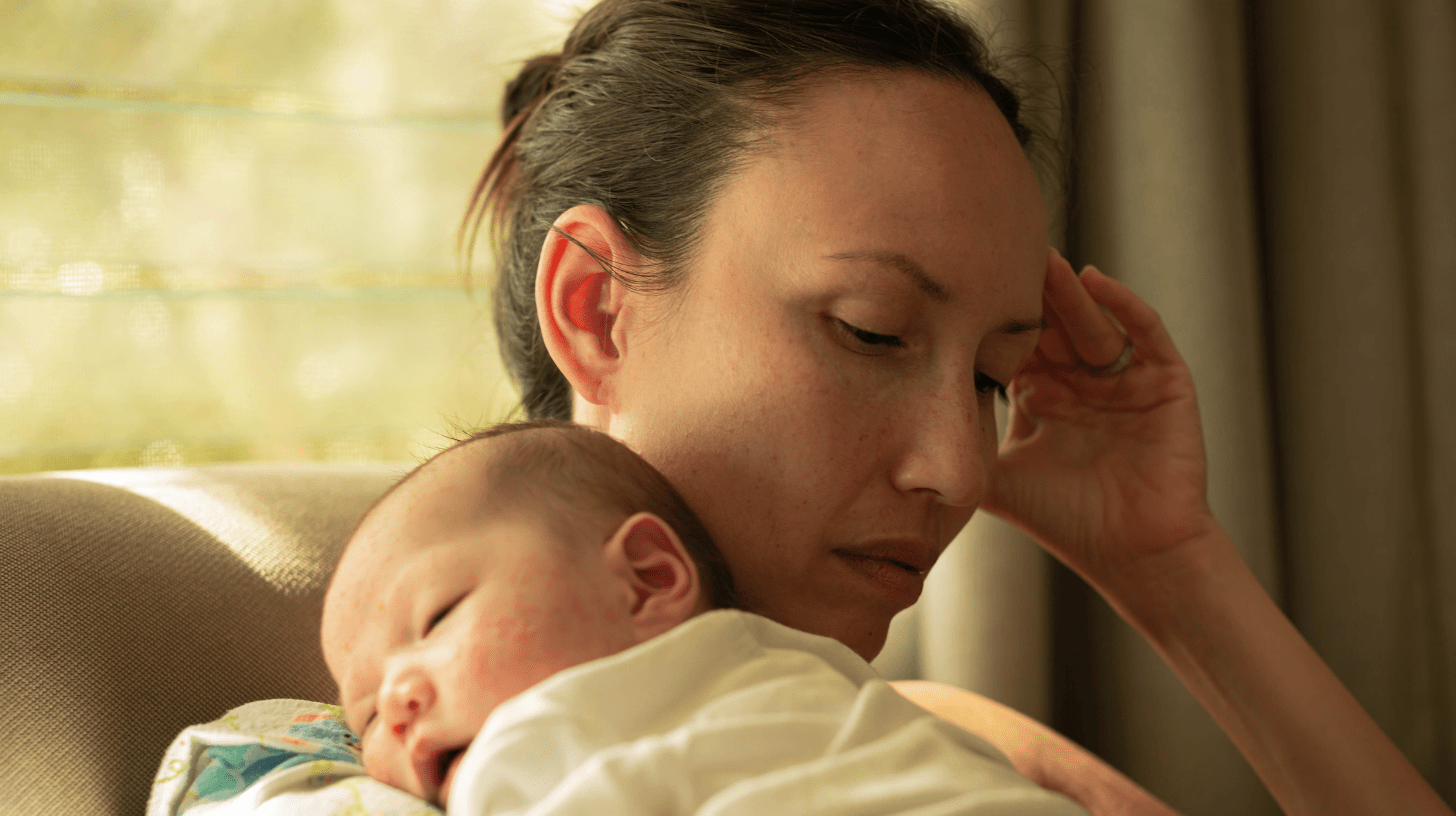Home » Understanding Postpartum Depression: Causes, Symptoms, and Treatment

Postpartum depression is a serious and often misunderstood condition that affects many new mothers. It is important to understand what postpartum depression is, its causes, symptoms, and available treatments in order to provide appropriate support to those affected.
Agenda:
- What is Postpartum Depression?
- The Causes of Postpartum Depression
- Recognizing the Symptoms of Postpartum Depression
- The Impact of Postpartum Depression on Mothers and Families

What is Postpartum Depression?
Postpartum depression, also known as postnatal depression, is a mood disorder that occurs after childbirth. It is not to be confused with the “baby blues,” which is a common and milder form of mood instability that typically resolves within a few weeks. Postpartum depression, on the other hand, is a more prolonged and severe condition that can significantly impact a mother’s well-being and ability to care for her baby.
Defining Postpartum Depression
Postpartum depression is characterized by feelings of extreme sadness, anxiety, and exhaustion that can interfere with daily functioning. It typically develops within the first few weeks after giving birth, although it can also appear later. The exact cause of postpartum depression is not fully understood, but it is believed to be a combination of physical, emotional, and hormonal factors.
When it comes to physical factors, the dramatic hormonal changes that occur during pregnancy and childbirth can contribute to the development of postpartum depression. The sudden drop in estrogen and progesterone levels after giving birth can affect neurotransmitters in the brain, leading to mood disturbances. Additionally, the physical toll of childbirth, sleep deprivation, and changes in body image can also play a role in the onset of postpartum depression.
Emotional factors can also contribute to postpartum depression. The transition to motherhood can be overwhelming and emotionally challenging. Many new mothers experience a range of emotions, including joy, love, and excitement, but they can also feel overwhelmed, anxious, and uncertain about their new role. The pressure to be a perfect mother and meet societal expectations can add to the emotional burden, increasing the risk of developing postpartum depression.
Furthermore, the lack of social support and inadequate access to healthcare services can exacerbate the symptoms of postpartum depression. Mothers who feel isolated, unsupported, or lack resources to seek help may struggle to cope with the challenges of motherhood, leading to the development or worsening of postpartum depression.
Common Misconceptions about Postpartum Depression
There are several misconceptions surrounding postpartum depression that can prevent women from seeking help or receiving appropriate support. One common misconception is that it is a sign of weakness or inability to be a good mother. In reality, postpartum depression is a medical condition that can affect any new mother, regardless of her parenting abilities or support system.
It is important to understand that postpartum depression is not a reflection of a woman’s character or her ability to care for her child. It is a complex interplay of biological, psychological, and social factors that can contribute to the development of this mood disorder. Seeking help and support is a sign of strength and a crucial step towards recovery.
Another misconception is that postpartum depression only affects women who have a history of depression. While having a history of depression or other mental health issues may increase the risk, postpartum depression can occur in women without any previous history of mental health problems.
Postpartum depression is not selective in who it affects. It can impact women from all walks of life, regardless of their age, socioeconomic status, or cultural background. It is essential to recognize that anyone can experience postpartum depression and that seeking help is essential for both the well-being of the mother and the healthy development of the baby.
By debunking these misconceptions and increasing awareness about postpartum depression, we can create a supportive and understanding environment for new mothers. It is crucial to provide education, resources, and access to mental health services to ensure that every mother receives the care and support she needs during this vulnerable period.

The Causes of Postpartum Depression
Postpartum depression is a complex condition with multiple contributing factors. Understanding these causes can help identify those at higher risk and develop effective treatment strategies.
Postpartum depression is not solely caused by one factor, but rather a combination of biological, environmental, psychological, and emotional factors. These factors interact and influence each other, making it important to consider the holistic picture when examining the causes of postpartum depression.
Biological Factors
Biological factors play a significant role in postpartum depression. After childbirth, there is a rapid drop in estrogen and progesterone levels, which can lead to chemical imbalances in the brain. These hormonal fluctuations can affect neurotransmitters, such as serotonin, which play a crucial role in regulating mood. Additionally, changes in thyroid hormone levels and disrupted sleep patterns may also contribute to the development of postpartum depression.
Furthermore, genetic factors can also influence a woman’s susceptibility to postpartum depression. Research suggests that individuals with a family history of depression or other mood disorders may be more prone to experiencing postpartum depression.
Environmental Triggers
Environmental factors can also contribute to the onset of postpartum depression. Financial stress, lack of social support, and unstable family dynamics can increase the risk of developing postpartum depression. The stress associated with adjusting to the demands of motherhood and caring for a newborn can also contribute to the development of this condition.
Moreover, the societal pressure to meet unrealistic expectations of motherhood can add to the emotional burden experienced by new mothers. The constant comparison to idealized images of motherhood portrayed in media can create feelings of inadequacy and self-doubt, further exacerbating the risk of postpartum depression.
Psychological and Emotional Factors
Psychological and emotional factors also play a significant role in the development of postpartum depression. Women with a history of depression or anxiety are more likely to experience postpartum depression. The hormonal changes and emotional upheaval that accompany childbirth can trigger or worsen pre-existing mental health conditions.
Additionally, the transition to motherhood can be challenging, as it involves significant changes in identity and lifestyle. Women may struggle with adjusting to their new roles and responsibilities, which can lead to feelings of overwhelm, isolation, and loss of autonomy. These psychological and emotional challenges can contribute to the development of postpartum depression.
It is important to note that postpartum depression is not a reflection of a woman’s ability to love or care for her child. It is a medical condition that requires understanding, support, and appropriate treatment.
Recognizing the Symptoms of Postpartum Depression
Recognizing the symptoms of postpartum depression is crucial for early intervention and treatment. It is important to note that the severity and duration of symptoms can vary from woman to woman.
Postpartum depression is a complex and multifaceted condition that can have a profound impact on a woman’s emotional well-being. While the “baby blues” are common and typically resolve within a few weeks, postpartum depression is characterized by persistent feelings of sadness, hopelessness, and emptiness. These emotional symptoms can be overwhelming and may make it difficult for women to fully enjoy the joys of motherhood.
Emotional Symptoms
Postpartum depression is characterized by persistent feelings of sadness, hopelessness, and emptiness. Women may also experience intense irritability, mood swings, and a loss of interest or pleasure in activities once enjoyed. They may have trouble bonding with their baby and may feel overwhelmed and guilty.
It is important to recognize that these emotional symptoms can vary in intensity and duration. Some women may experience mild symptoms that come and go, while others may experience more severe and persistent symptoms that require professional intervention and treatment.
Women with postpartum depression may also experience a range of other emotional symptoms, including anxiety, feelings of worthlessness, and a sense of detachment from their baby. These symptoms can have a significant impact on a woman’s overall well-being and may interfere with her ability to care for herself and her child.
Physical Symptoms
In addition to emotional symptoms, postpartum depression can also manifest with physical symptoms such as changes in appetite, sleep disturbances, excessive fatigue, and decreased energy levels. Some women may experience physical aches and pains that cannot be explained by an existing medical condition.
These physical symptoms can further exacerbate the emotional distress experienced by women with postpartum depression. The lack of energy and chronic fatigue can make it challenging for women to engage in daily activities and care for their baby. Sleep disturbances can also contribute to feelings of irritability and difficulty concentrating.
Behavioral Changes
Changes in behavior are common in women with postpartum depression. They may withdraw from social interactions, have difficulty concentrating, and experience difficulty making decisions. Some women may also engage in risky behaviors or have thoughts of self-harm or harming their baby. These symptoms should never be ignored and should be taken seriously.
It is important to understand that these behavioral changes are not a reflection of a woman’s character or abilities as a mother. Postpartum depression is a medical condition that requires understanding, support, and appropriate treatment.
Women with postpartum depression may also experience changes in their appetite and weight, either an increase or decrease. These changes can further impact a woman’s self-esteem and body image, adding to the emotional burden she is already carrying.
Recognizing the symptoms of postpartum depression is the first step towards seeking help and support. It is essential for healthcare providers, family members, and friends to be vigilant and supportive in identifying and addressing these symptoms. With early intervention and appropriate treatment, women with postpartum depression can find relief and regain their emotional well-being.
The Impact of Postpartum Depression on Mothers and Families
Postpartum depression not only affects the mother but can also have a substantial impact on the entire family unit.
Effects on the Mother
The effects of postpartum depression on mothers can be significant and long-lasting if left untreated. It can impair their ability to care for themselves and their baby, leading to feelings of guilt and inadequacy. Mothers with postpartum depression may also struggle with feelings of shame and isolation, further worsening their condition.
Effects on the Child
The impact of postpartum depression on the child can be profound. Studies have shown that infants of mothers with postpartum depression may experience developmental delays, behavioral problems, and difficulties with emotional regulation. The disrupted mother-infant bond can also have long-term consequences on the child’s social and emotional development.
Effects on the Family Dynamics
Postpartum depression can strain relationships within the family. Partners may feel helpless or overwhelmed, leading to increased tension and conflict. Siblings may also be affected, as the mother’s ability to provide emotional support and care may be compromised.
In conclusion, understanding postpartum depression is crucial in providing appropriate support to affected mothers and their families. By recognizing the causes, symptoms, and impact of postpartum depression, healthcare professionals and support networks can work together to develop effective treatment strategies and reduce the stigma associated with this condition.
How Therapy For Moms Can Help
Therapy For Moms provides a safe and nurturing environment where mothers can openly express their emotions and cope with the overwhelming feelings associated with the transition to motherhood. Through honest and open discussions, they welcome all thoughts, even the irrational or scary ones, helping mothers develop new coping skills and gain a deeper understanding of their minds. This supportive postpartum therapy can be particularly beneficial for mothers struggling with postpartum depression, as it helps them manage and overcome the emotional challenges that often accompany this condition, ultimately enabling them to navigate the journey of motherhood more effectively. We help with postpartum depression and a variety of treatments for mothers. Please visit our therapy services for moms.


